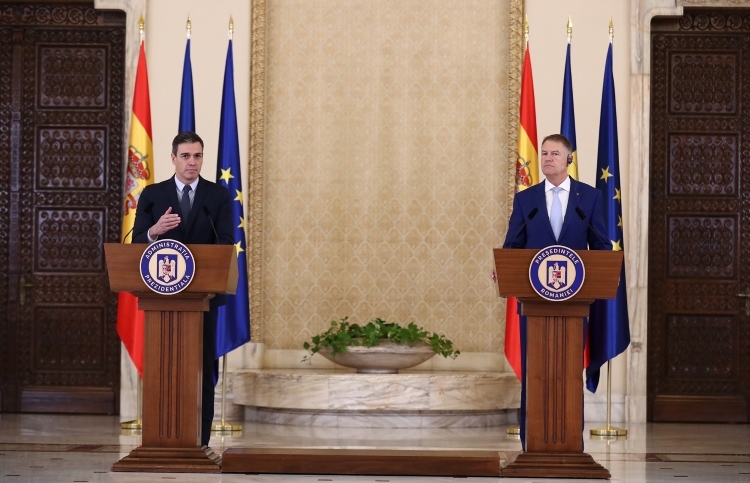The Diplomat
The President of the Government, Pedro Sánchez, received yesterday the support of the President of Romania, Klaus Iohannis, for the Spanish proposal to promote energy interconnections in the European Union (EU) to reduce dependence on Russia.
The President of the Government, who traveled yesterday to Bucharest as part of his tour of several European partners to address the problem of energy prices before the European Council on March 24 and 25, was received by the Prime Minister of Romania, Nicolae Ciucă, with whom he discussed the war in Ukraine, the humanitarian situation and the solidarity of European countries with the reception of refugees.
He also held a meeting with President Iohannis, with whom Sánchez will coincide again at the next Council next week and with whom he held “a productive meeting to thoroughly prepare that appointment”, as reported by the President of the Government in the statement offered by both to the media at the presidential palace of Cotroceni, in Bucharest.
“We note with satisfaction that, little by little, we are receiving a more favorable reception to our proposals to contain the price of energy,” Sánchez continued, referring to Spain’s position in favor of decoupling gas and electricity prices, joint European purchases, diversification of supply and a commitment to renewable energies. The debate on this issue began in September, but has taken on a new dimension with the invasion of Ukraine and the EU’s attempts to minimize energy dependence on Russia. Spain and Romania, along with France, Italy, Portugal and Greece, presented a non-paper in December 2021 in which they proposed revising the markets to adapt them to the increased presence of renewables in the generation mix.
“I think we all agree that it is necessary to cut this ‘contagion effect’ that the price of gas is having on electricity prices as a whole,” warned Sánchez. “It is important that the EU acts urgently and does not postpone the decision” and that the Council adopts next week “a position as forceful as possible, with measures as urgent and fast as possible, so that we can guarantee price levels that are not so volatile but more appropriate to the needs and defense of industry, the economy and the welfare of our citizens,” he added.
For his part, Klaus Iohannis declared that Romania is in favor of ensuring energy security in the EU and eliminating dependence on Russia, an issue of “strategic importance” in the current conflict in Ukraine. For this reason, the leader yesterday conveyed to Sánchez his country’s willingness to support the Spanish proposal to “develop energy transport infrastructures, guarantee interconnectivity between member states and increase production and storage capacity.” “Romania is ready to offer its energy infrastructure to diversify the supply of natural gas with multiple sources,” he assured in the statement to the media.
During the meeting, the two leaders also addressed the Putin regime’s “illegal, unjust and unjustified aggression against Ukraine” and Sanchez praised Romania’s effort to take in refugees from the war. Likewise, Sanchez and Iohannis committed to hold a bilateral summit between Spain and Romania in 2022.
Spain and Portugal’s proposal to Brussels
On the other hand, the Third Vice-President and Minister for Ecological Transition, Teresa Ribera, confirmed yesterday in Brussels that Spain and Portugal are going to submit a proposal to the European Commission to limit the wholesale price of electricity to 180 euros per megawatt hour (MWh) -one third of the historical maximum registered this very month-, as the Portuguese Minister of Energy, Joao Pedro Matos Fernandes, had advanced.
“It is obvious that we seek respect for European rules, but too much time has passed and it is going too slowly,” Ribera declared before her participation in the meeting of the Council of Environment Ministers of the European Union. “In the absence of European backing, our obligation is to do this on our own,” she continued. “If the Commission does not react in time, we may find that each Member State that has unsustainable pressure from its society does as it sees fit, and that, instead of having one lesser evil supported by all, we have 27 different solutions,” she warned.






